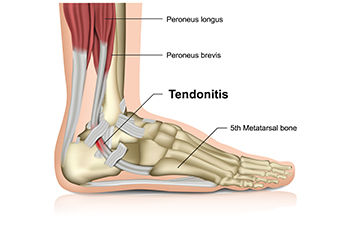Definitions and Causes of Achilles Tendon Injuries
Tuesday, 30 January 2024 00:00
The Achilles tendon, a robust fibrous band connecting the calf muscles to the heel bone, plays a pivotal role in facilitating movements like walking and running. Achilles tendon injuries encompass a spectrum of conditions, primarily characterized by inflammation, strain, or, in severe cases, tears within this vital tendon. Such injuries often result from overuse or excessive strain during physical activities, especially those involving sudden acceleration or deceleration. Poorly fitting footwear, inadequate warm-up routines, and abrupt changes in physical activity intensity may contribute to the risk of injury. Additionally, individuals with tight calf muscles or pre-existing foot conditions may find themselves more susceptible to Achilles tendon issues. Recognizing the signs, which may include pain, swelling, and restricted movement, is essential for prompt intervention. If you have endured an Achilles tendon injury, it is strongly suggested that you consult a podiatrist who can accurately diagnose and treat this condition.
Achilles tendon injuries need immediate attention to avoid future complications. If you have any concerns, contact Naim G. Shaheed, DPM of Ankle and Foot Centers of Georgia. Our doctor can provide the care you need to keep you pain-free and on your feet.
What Is the Achilles Tendon?
The Achilles tendon is a tendon that connects the lower leg muscles and calf to the heel of the foot. It is the strongest tendon in the human body and is essential for making movement possible. Because this tendon is such an integral part of the body, any injuries to it can create immense difficulties and should immediately be presented to a doctor.
What Are the Symptoms of an Achilles Tendon Injury?
There are various types of injuries that can affect the Achilles tendon. The two most common injuries are Achilles tendinitis and ruptures of the tendon.
Achilles Tendinitis Symptoms
- Inflammation
- Dull to severe pain
- Increased blood flow to the tendon
- Thickening of the tendon
Rupture Symptoms
- Extreme pain and swelling in the foot
- Total immobility
Treatment and Prevention
Achilles tendon injuries are diagnosed by a thorough physical evaluation, which can include an MRI. Treatment involves rest, physical therapy, and in some cases, surgery. However, various preventative measures can be taken to avoid these injuries, such as:
- Thorough stretching of the tendon before and after exercise
- Strengthening exercises like calf raises, squats, leg curls, leg extensions, leg raises, lunges, and leg presses
If you have any questions please feel free to contact one of our offices located in Lithonia/Stonecrest and Emory/Midtown, GA . We offer the newest diagnostic tools and technology to treat your foot and ankle needs.








